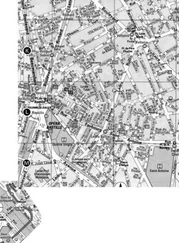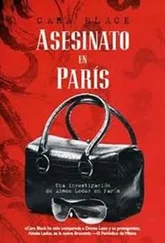She had to set that aside, worry about it later, had to concentrate on Laure’s predicament. She had to see the lab report for herself; she needed more facts to go on. She pulled out the list she’d copied of the partygoers the police had questioned, hoping the man she’d seen with the backpack was on it.
OF THE twenty names, she managed to reach eighteen by phone. The first, who identified himself as in “advertising,” replied that he’d enjoyed the hors d’oeuvre table and the blonde he’d met. That was all he remembered. And it went downhill from there. A couple commented that with all the music they hadn’t been able to have much conversation with anyone else. Two of the models indicated they’d been on their cell phones much of the time confirming their next day’s bookings.
The catering-firm owner, a Monsieur Pivot, spoke for his staff. His caterers had slaved in a hot kitchen and hadn’t had a break until the police arrived. Pivot was sure of that—“They’d be in trouble otherwise.” The bossa nova quartet’s guitarist confirmed that they had played until eleven-thirty, just before the police arrived. She left messages for the two others she’d been unable to reach and hoped for a call back.
Just before noon, sick of the phone, she changed into a wool pinstripe trouser suit, the warmest outfit in her armoire, outlined her eyes in kohl, and slipped on her coat. She had recalled where she’d seen Conari’s name: on trucks all around Paris.
Half an hour later, she stood on avenue Junot at the Conari firm’s address on the upscale side of Montmartre at the crest of the northwest slope. She entered a remodeled artist’s atelier housing several architecture and construction firms. Conari’s offices occupied an entire floor; the firm was prosperous if the building and its location were anything to go by.
“No appointment?” said the receptionist, with a perfunctory smile. She had short curly brown hair and good teeth. So good Aimée figured her paycheck had gone into them. “I’m sorry, Monsieur Conari’s working on a deadline. It’s impossible.”
Aimée shifted in her high-heeled boots, wishing she’d worn her two-inch heels instead. “A homicide occurred in the apartment across from where he hosted a party last night. I have a few follow-up questions, routine, of course, that will take five minutes. Guaranteed. It’s necessary to the investigation.”
“But he’s too busy—”
“Just ask him. He’s been so cooperative already I hate to intrude, but I promise to take just five minutes of his time.”
The receptionist hesitated, picked up the phone. “Monsieur Conari, there’s a”—she glanced at Aimée’s card, flashed her teeth again—“a Mademoiselle Leduc of Leduc Detective who insists she needs to speak with you.”
The receptionist blinked. “Of course, Mademoiselle, go right in. Second door on the left.”
Aimée’s heels sank into the deep pile of the carpeted hallway whose walls were lined with abstract black-and-white paintings. She knocked on the door.
“Entréz .”
Floor-to-ceiling windows greeted her, a wall of glass giving a panoramic view of the rooftops below. What looked like several loft spaces had been combined into a large room with a cathedral-type glass ceiling that soared upward.
She focused on a middle-aged charcoal-haired man leaning over a drawing table, his shirtsleeves rolled up.
“Monsieur Félix Conari? I’m Aimée Leduc,” she said. “Pardon me for disturbing you.”
“Of course, no problem,” he said, concern in his voice. “Please sit down.”
He indicated a low-slung red leather chair that looked difficult to get out of.
“ Non, merci , you’re busy and I’ll get to the point,” she said, pulling out the list of partygoers from her bag. “Can you describe what happened at your party last night?”
Félix Conari rubbed his chin. “Tiens , let me think, the quartet played, my guests seemed entertained, the caterers kept stocking the bar and refilling the hors d’oeuvres trays, I made sure of that,” he said, in a down-to-earth tone. “You see, the guests were clients, important to my firm. We were about to go in to dinner. Yes, that’s right, and then the commissaire came.”
“That’s all you remember, Monsieur Conari?”
He expelled air from his mouth, shrugged. “ Oui. But let me call Yann, he was there last night.”
Conari hit an intercom button on his desk. She noted a Yann Marant on her list, one of the two she had not reached.
A moment later, a man in his thirties, wearing a rumpled black suit and Adidas track shoes, with long brown hair curling behind his ears, came in.
“My friend Yann Marant, a software engineer consulting with my firm,” Conari introduced him. “Mademoiselle Leduc’s a detective investigating the incident last night.”
Aimée noted the telltale calluses on the edge of Yann Marant’s palm. A systems analyst or programmer, she figured.
Yann smiled. A nice smile.
“Sorry to bother you, Monsieur Marant, but I understand you attended Monsieur Conari’s party,” Aimée said.
Yann nodded. “Do we need to identify someone in a lineup, a suspect? Is that why you’re here?”
He watched too much télé. “Not quite yet,” Aimée said.
“I want to help, but . . .” Marant shook his head. “I was preoccupied last night.”
“You know these software engineers.” Félix gave a small smile, slapping him on the back. “Code, numbers whirling in his mind all the time. It’s hieroglyphics to me, but I pull him back to earth from time to time.”
Aimée wondered if Marant was good. She and René used a consulting-systems analyst from time to time. They would need one if their proposals worked out, but since Marant had been hired by a successful outfit like Conari’s she doubted he’d be in their price range.
“The commissaire told us very little,” Yann said. “We’re in the dark as to what happened.”
Intelligence radiated from these men. They were not the type she could fob off with dumbed-down information.
“That’s standard procedure, Monsieur. In investigations like this, the officers must gather all the facts before any hypothesis can be made. That’s why I’m here, disturbing you,” she said and smiled. “Monsieur Marant, try to think back to last night, just before eleven o’clock. Did you hear a loud noise or notice anything happening outside the window?”
He shrugged. “I worked in Félix’s study. There are no windows. Then, Félix, your guest arrived, the musician? I lost track of time—”
“I take it the police questioned him,” Aimée said. “His name?”
Félix Conari’s hand clutched the slanted table’s edge. “He’s shy, that one, Lucien. A unique musician.”
Aimée scanned the names. “There’s no Lucien listed here. His last name?”
“Sarti. A Corsican DJ and musician. He mixes traditional polyphony and hip-hop.”
No Lucien Sarti. Aimée thought of the timing and the man watching at the gate. “Does he have black hair and was he wearing a black leather jacket and carrying a backpack?”
Félix grinned. “That describes many of my guests. But, yes, he is tall, rail thin, and has black curly hair.”
“How can I reach him?”
“Look, Mademoiselle, I don’t want to get him involved in this.”
“Of course not, but I need help, all the help I can get. I must speak with everyone. Can you give me his phone number?”
“Lucien’s a musician, a free spirit,” Conari said. “No phone. I contact him through a resto, Strago, and leave messages for him.”
She wrote that down. “You mentioned your guests were clients,” she said. “I’m curious as to how you know this musician, Lucien Sarti.”
Читать дальше











